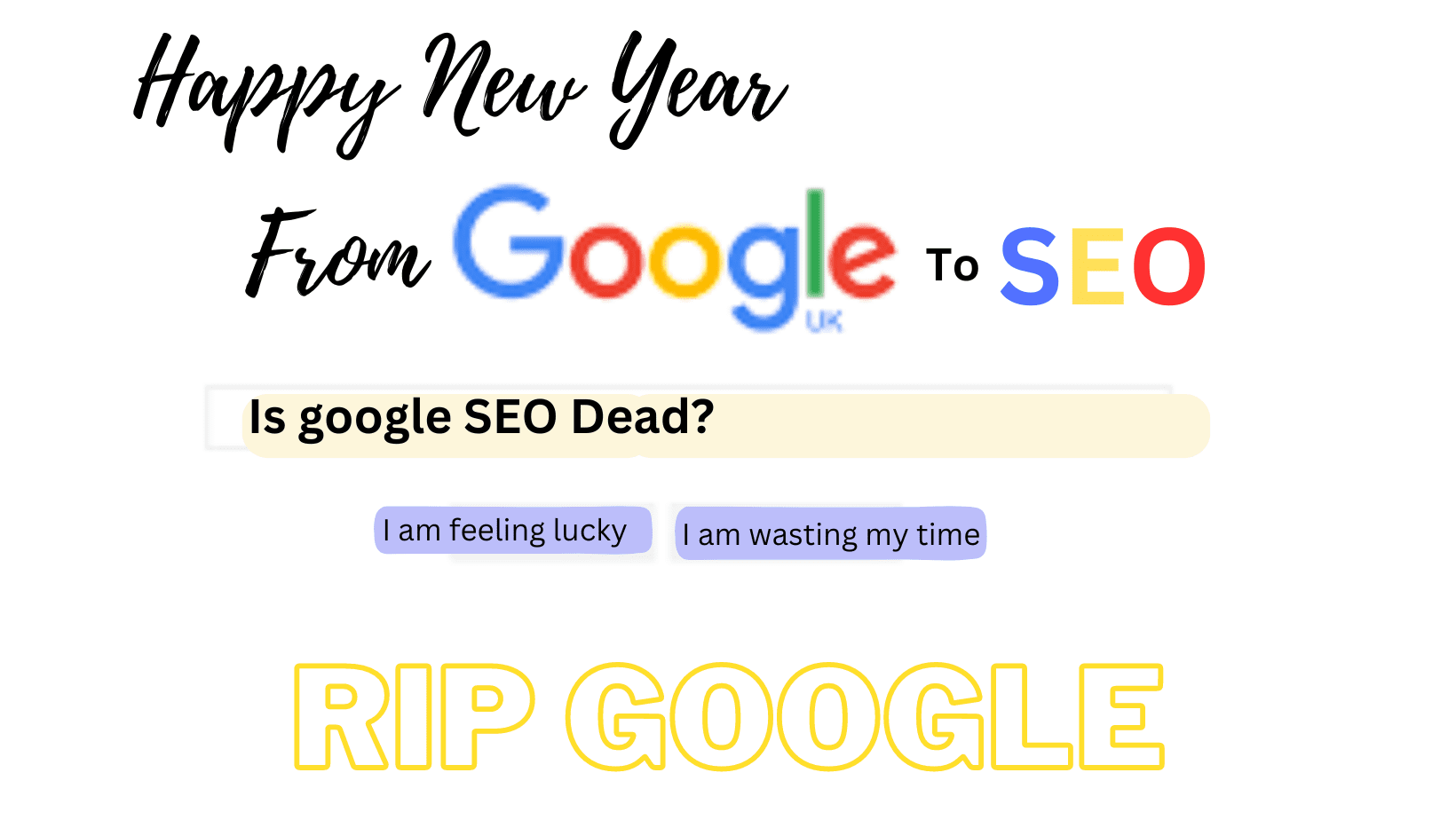Google SEO is dead – RIP SEO [search engine optimisation]
This article aims to explore whether Google is intentionally suppressing SEO efforts, if its actions are unintentional missteps, and the ramifications for businesses and customers.
In the ever-evolving landscape of the digital world, Google has established itself as the undisputed leader in search engine technology. With its dominance, however, comes a growing concern among businesses and digital marketers about the impact of Google’s decisions on search engine optimization (SEO) strategies.
The Evolution of Google and SEO
To understand the current state of SEO and Google’s role in it, it is essential to delve into the evolution of the search engine giant and its relationship with digital marketing strategies.
A. The Rise and Fall of Google and SEO
Google’s inception marked a paradigm shift in how information was accessed on the internet. Its algorithmic approach to search results, based on relevance and quality, revolutionized the online experience. As businesse’s flocked to the internet, SEO emerged as a crucial tool to enhance online visibility and reach target audiences.
B. Google’s Algorithm Updates
Over the years, Google has rolled out numerous algorithm updates, such as Panda, Penguin, and more recently, BERT. These updates aimed to refine search results, penalize spammy practices, and prioritize user-friendly content. However, the rapid changes often left businesses scrambling to adapt their SEO strategies, raising questions about Google’s intentions and all of the updates have caused destruction and chaos in its path, blasting through googles algorithm like an out of control tornado.
The Google Ads Dilemma
A. Suspensions and the Impact on Businesses
One of the contentious issues businesses face is the suspension of million’s of Google Ads accounts. Thousands of advertisers have reported sudden suspensions, leading to financial losses, disrupted marketing campaigns and bankruptcy. This has sparked debates about Google’s commitment to fair practices and the impact on businesses that heavily rely on paid advertising, but more importantly poor customer service from google regarding mainly from online google certification so called ad specialist’s mostly based in India, who’s first language is not English.
B. Google’s Responsibility to Users and customers
Critics argue that Google, as a dominant force in online advertising, bears a responsibility to ensure transparency and fairness in its dealings with advertisers. The arbitrary suspension of accounts raises concerns about the lack of communication and accountability, leaving businesses questioning whether Google truly values its users and customers?
Customer Service and Satisfaction
A. The Role of Customer Service in Tech Giants
As a tech giant, Google has the resources to provide exceptional customer service. However, the reality often falls short of expectations. Businesses and advertisers struggling with account suspensions and SEO challenges voice frustrations about the lack of direct communication and timely resolution, raising questions about Google’s commitment to customer satisfaction.
B. Balancing Algorithmic Precision and User Relations
Google’s reliance on complex algorithms raises the question of whether the company prioritizes algorithmic precision over maintaining positive relationships with its users. Striking the right balance is crucial, as decisions made by algorithms can have far-reaching consequences for businesses, consumers, and the overall online ecosystem.
The Impact on Small Businesses
A. Survival Challenges for Small Businesses
The upheaval caused by Google’s actions, intentional or not, disproportionately affects small businesses. Many rely on SEO and affordable advertising options to compete with larger enterprises. The unpredictability of algorithm updates and ad account suspensions can be particularly detrimental to the survival of any small enterprises, leading to a growing sense of disillusionment.
B. Google’s Responsibility Toward’s Small Businesses
Google’s influence extends to shaping the fate of countless small businesses worldwide. The question arises: does Google have a moral responsibility to safeguard the interests of these smaller entities, or is it solely focused on its corporate interests? Analysing the impact on small businesses provides valuable insights into the ethical considerations surrounding Google’s actions.
The User-Company-Google Dynamic
A. A Symbiotic Relationship
The intricate relationship between users, companies, and Google forms the backbone of the digital ecosystem. Users rely on Google for information, companies utilize Google’s services for visibility, and Google benefits from user engagement and advertising revenue. When this delicate balance is disrupted, as seen with SEO challenges and ad suspensions, it raises questions about the sustainability of this symbiotic dynamic, as it seems that google is doing whatever it wants, like a school playground bully to destroy businesses that rely on customers that use online shopping
B. The Perception of Google’s Intentions
The perception of whether Google is intentionally targeting certain businesses or if its actions are unintentional mistakes plays a pivotal role in shaping attitudes towards the company. Examining the evidence and considering the motivations behind Google’s decisions provides a clearer picture of its intentions and their implications.
Google’s Future and Its Users
A. The Need for Transparency and Communication
To rebuild trust and maintain a positive relationship with its users, Google must prioritise transparency and open communication. Clear guidelines, timely notifications, and responsive customer support can mitigate the negative impact of algorithmic changes and ad suspensions.
B. Striking a Balance Between Innovation and Stability
Google’s continuous quest for innovation should not come at the expense of stability and user satisfaction. Striking a balance between pushing technological boundaries and ensuring a reliable and user-friendly experience is crucial for Google’s sustained success.
Conclusion
In the intricate dance between Google, businesses, and users, the line between intentional actions and unintentional consequences becomes increasingly blurred. As Google continues to evolve, disrupt and shape the digital landscape, the impact on search engine optimization, advertising, and customer relations remains a topic of intense debate. Ultimately, the resolution lies in Google’s hands, as it navigates the delicate balance between innovation, corporate interests, and the well-being of its vast user base.





















